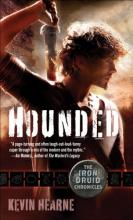The Iron Druid Chronicles - Kevin Hearne

The Iron Druid Chronicles is an urban fantasy series featuring a druid living in modern Arizona. It has a lot of similarities to the Dresden Files by Jim Butcher, so I will be comparing the two. If you haven't read the Dresden Files, they're very good, and I highly recommend them. Currently, Hearne has finished 7 Iron Druid books, one will be published in January 2016, and there will be one more before the series is finished.
The style of humor in the two series is very different. The Dresden Files feels more lighthearted. Butcher features a lot of references to modern culture -- movies, books, etc -- whereas Hearne mostly sticks to Shakespeare references. As a result, despite the modern setting, the Iron Druid Chronicles has more of an over-dramatic tone.
The worldbuilding in Iron Druid seems less well-developed than in the Dresden Files. I have heard the distinction made between "soft" sci-fi or fantasy and "hard" sci-fi or fantasy. In hard fantasy, there are underlying rules to everything. Even though there is magic, the magic has a physics to it. Name of the Wind, Brandon Sanderson's novels, and the Dresden Files are all examples of hard fantasy. Even if the reader doesn't know all of the rules, we know that the rules are there. In soft fantasy, on the other hand, there is a feel that some things happen that are just magic without a clear underlying explanation. Iron Druid does seem to have a few rules, but new ones seem to be continually introduced, which makes it seem like a process of Deus Ex Machina.
The underlying premise behind the worlds is also different. Both Iron Druid and the Dresden Files have the basic idea that all of the myths that humans have are real. However, in the Dresden Files, I get the general impression that there was a reality underlying those myths originally and the myths were created by people who observed that underlying reality. Yes, human belief has its own power (eg, faith magic and the Venatori), but belief is not the origin of magic or other fantastical elements, and fantastical elements exist independent of belief about them (eg, Hades). In Iron Druid, human belief is the origin of all magical things, so when there are multiple prominent myths about an entity (eg, a TV show and a book that paint a Greek God differently), there will be multiple instances of that entity. I think that both can be interesting premises, and I think that works like Planescape: Torment have done a good job with the "belief is the root of everything" idea. However, in Dresden, making fantastic elements a part of nature gives the world a big, complex, and magical feel, whereas in Iron Druid, making belief the root of everything gives the world a trite and irreverent feel.
Despite all that, the series is generally well done. I enjoyed it, I plan on finishing it, and I recommend it to folks who enjoyed the Dresden Files.



